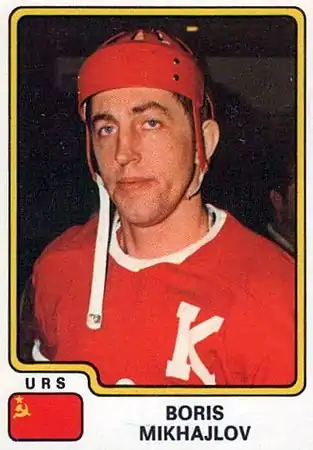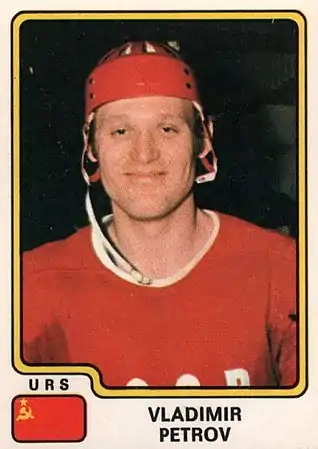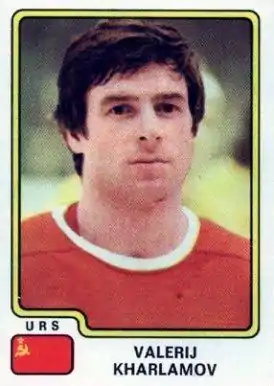Soviet Union men's national ice hockey team
The Soviet national ice hockey team[lower-alpha 1] was the national men's ice hockey team of the Soviet Union. From 1954, the team won at least one medal each year at either the Ice Hockey World Championships or the Olympic hockey tournament.
 | |
| Nickname(s) | Красная Машина (The Red Machine) |
|---|---|
| Most games | Alexander Maltsev (321) |
| Top scorer | Alexander Maltsev (213) |
| Most points | Sergei Makarov (248) |
| IIHF code | URS |
.png.webp) | |
| First international | |
(East Berlin, East Germany; 22 April 1951) | |
| Biggest win | |
(Colorado Springs, United States; 26 December 1967) | |
| Biggest defeat | |
(Ottawa, Canada; 9 January 1986) (Prague, Czechoslovakia; 21 March 1975) | |
| IIHF World Championships | |
| Appearances | 32 (first in 1954) |
| Best result | |
| Canada Cup | |
| Appearances | 5 (first in 1976) |
| Best result | |
| Olympics | |
| Appearances | 9 (first in 1956) |
| Medals | |
| International record (W–L–T) | |
| 738–110–65 | |
After its dissolution in 1991, the Soviet team competed as the CIS team (part of the Unified Team) at the 1992 Winter Olympics. After the Olympics, the CIS team ceased to exist and was replaced by Russia at the 1992 World Championship. Other former Soviet republics (Belarus, Estonia, Kazakhstan, Latvia, Lithuania and Ukraine) established their own national teams later that year. The International Ice Hockey Federation (IIHF) recognized the Ice Hockey Federation of Russia as the successor to the Soviet Union hockey federation and passed its ranking on to Russia. The other national hockey teams were considered new and sent to compete in Pool C.
The IIHF Centennial All-Star Team included four Soviet-Russian players out of a team of six: goalie Vladislav Tretiak, defenseman Vyacheslav Fetisov and forwards Valeri Kharlamov and Sergei Makarov who played for the Soviet teams in the 1970s and the 1980s were selected for the team in 2008.[1]
History
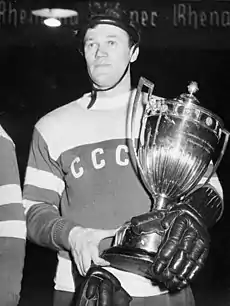
Ice hockey was not properly introduced into the Soviet Union until the 1940s, though bandy, a similar game played on a larger ice field, had long been popular in the country. It was during a tour of FC Dynamo Moscow of the United Kingdom in 1945 that Soviet officials first got the idea of establishing an ice hockey program. They watched several exhibition matches in London, and National Hockey League President Clarence Campbell would later say that "This was the time when the Russians got the idea for their hockey team. The Russian soccer players were more interested in watching Canadian players play hockey than in soccer."[2] The Soviet Championship League was established in 1946, and the national team was formed shortly after, playing their first matches in a series of exhibitions against LTC Praha in 1948.[3]
The Soviets planned to send a team to the 1953 World Championships, but due to an injury to Vsevolod Bobrov, one of their star players, officials decided against going.[4] They would make their debut at the 1954 World Championships instead. Largely unknown to the larger hockey world, the team surprised many by winning the gold medal, defeating Canada in the final game.[5]
The Soviets played their first exhibition tour in Canada in 1957, which perpetuated a rivalry between the countries.[6] Throughout the rest of the 1950s the World Championships were largely contested between Canada and the Soviet Union. That changed in the early 1960s. Canada won the gold in 1961, and after missing the 1962 tournament due to political issues, the Soviets would win the gold medal every year until 1972.[7] They faced perhaps their greatest upset at the 1976 World Championships; in their opening match against host Poland, the Soviets were defeated 6–4.[8]
In 1972 the Soviets played Canada in an exhibition series that saw the Soviet national team play a team composed of National Hockey League (NHL) players for the first time. Both the Olympics and World Championships did not allow professionals, so the best Canadian players were never able to compete against the Soviets, and in protest at this Canada had left international hockey in 1970. This series, known as the Summit Series, was a chance to see how the NHL players would fare. In eight games (four in Canada, four in the USSR), the teams were close, and it took until the final 34 seconds of the eighth game for Canada to win the series, four games to three, with one tie.[9]
At the 1980 Winter Olympics, the Soviets also had one of their most notable losses. Playing the United States in the medal round, the Soviets lost 4–3. This match, later dubbed the Miracle on Ice, was notable because it had the Soviets, recognized as the top international team in the world, against an American team composed largely of university-level players. The Americans would go on to win the gold medal in the tournament, while the Soviets finished with the silver, only the second time they failed to win gold at the Olympics since their debut in 1956.[10]
The reforms of the 1980s in the Soviet Union had a detrimental effect on the national team. No longer afraid to speak out against their treatment, players like Viacheslav Fetisov and Igor Larionov openly critiqued the management style of their coach, Viktor Tikhonov, which included being secluded in a military-style barracks for eleven months of the year. They also sought the chance to move to North America and play in the NHL, though the authorities were reluctant to allow this. Negotiations with the NHL began in the late 1980s over this, and in 1989 several players, including both Fetisov and Larionov, were permitted to leave the Soviet Union and join NHL teams.
Yuri Korolev was head of the research group for the national men's team from 1964 to 1992, and contributed to the team winning seventeen Ice Hockey World Championships and seven Winter Olympic Games gold medals.[11][12]
Soviet journalist Vsevolod Kukushkin traveled with the national team as both a reporter and an English to Russian translator. He had access to the team's locker room and the opportunity to speak directly with the players and be part of their daily life.[13] In his 2016 book The Red Machine, Kukushkin reported that the nickname for the Soviet national team came into usage during the 1983 Super Series, when a headline in a Minneapolis newspaper headline read "The Red Machine rolled down on us".[14]
Statistics
Leading scorers (Olympics, World Championships, Canada Cups, 1972 Summit Series)
- Sergei Makarov – 248 points
- Aleksandr Maltsev – 213+ points
- Valeri Kharlamov – 199 points
- Boris Mikhailov – 180 points
- Vladimir Petrov – 176 points
Tournament record
Olympic Games
| Games | GP | W | L | T | GF | GA | Coach | Captain | Finish |
|---|---|---|---|---|---|---|---|---|---|
| 7 | 7 | 0 | 0 | 40 | 9 | Arkady Chernyshev | Vsevolod Bobrov | ||
| 7 | 4 | 2 | 1 | 40 | 23 | Anatoli Tarasov | Nikolai Sologubov | ||
| 8 | 8 | 0 | 0 | 73 | 11 | Arkady Chernyshev | Boris Mayorov | ||
| 7 | 6 | 1 | 0 | 48 | 10 | Arkady Chernyshev | Boris Mayorov | ||
| 5 | 4 | 0 | 1 | 33 | 13 | Arkady Chernyshev | Viktor Kuzkin | ||
| 6 | 6 | 0 | 0 | 56 | 14 | Boris Kulagin | Boris Mikhailov | ||
| 7 | 6 | 1 | 0 | 63 | 17 | Viktor Tikhonov | Boris Mikhailov | ||
| 7 | 7 | 0 | 0 | 48 | 5 | Viktor Tikhonov | Viacheslav Fetisov | ||
| 8 | 7 | 1 | 0 | 45 | 13 | Viktor Tikhonov | Viacheslav Fetisov | ||
| As | |||||||||
| 1994 – present | Since 1994 Soviet Union and Unified Team have been succeeded by | ||||||||
World Championship
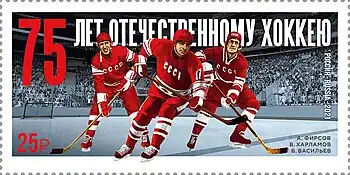
Canada Cup
Other tournaments
- Deutschland Cup:
 Gold medal (1988, 1991)
Gold medal (1988, 1991) - Nissan Cup:
 Gold medal (1990)
Gold medal (1990)
Team
Notable players
- Yevgeny Babich
- Helmuts Balderis
- Vsevolod Bobrov
- Vyacheslav Bykov
- Vitaly Davydov
- Vyacheslav Fetisov
- Anatoli Firsov
- Valeri Kamensky
- Sergei Kapustin
- Alexei Kasatonov
- Valeri Kharlamov
- Vladimir Krutov
- Alfred Kuchevsky
- Igor Larionov
- Sergei Makarov
- Alexander Maltsev
- Boris Mikhailov
- Vladimir Petrov
- Alexander Ragulin
- Vyacheslav Starshinov
- Vladislav Tretiak
- Valeri Vasiliev
- Alexander Yakushev
- Yevgeni Zimin
- Viktor Zinger
Amateur status of players
Until 1977, professional players were not able to participate in the World Championship, and it was not until 1988 that they could play in the Winter Olympics. However, the Soviet team was populated with amateur players who were primarily full-time athletes hired as regular workers of a company (aircraft industry, food workers, tractor industry) or organization (KGB, Red Army, Soviet Air Force) that sponsored what would be presented as an after-hours social sports society hockey team for their workers in order to keep their amateur status.[15][16][17] By the 1970s, several national hockey federations, such as Canada, protested the use of the amateur status for players of Eastern Bloc teams and even withdrew from the 1972 and 1976 Winter Games in protest.[18]
Coaching history
| Years | Coach | Achievements |
|---|---|---|
| 1953 | Anatoli Tarasov | |
| 1953–1957 | Arkady Chernyshev | 1 Olympic gold medal, 2 World Championship gold medals, 2 World Championship silver medals |
| 1958–1960 | Anatoli Tarasov | 1 Olympic bronze medal, 2 World Championship silver medals |
| 1961–1972 | Arkady Chernyshev | 3 Olympic gold medals, 9 World Championship gold medals, 1 World Championship silver medal, 1 World Championship bronze medal |
| 1972–1974 | Vsevolod Bobrov | 2 World Championship gold medals |
| 1974–1977 | Boris Kulagin | 1 Olympic gold medal, 1 World Championship gold medal, 1 World Championship silver medal, 1 World Championship bronze medal |
| 1977–1991 | Viktor Tikhonov | 2 Olympic gold medals, 1 Olympic silver medal, 8 World Championship gold medals, 2 World Championship silver medals, 2 World Championship bronze medals |
References
- IIHF (2008). "Who are the best six of all time?". IIHF.com. Retrieved 20 May 2017.
- Martin, Lawrence (1990). The Red Machine: The Soviet Quest to Dominate Canada's Game. Toronto: Doubleday Canada. pp. 25–26.
- Martin. The Red Machine. pp. 31–32.
- Martin. The Red Machine. p. 34.
- IIHF (2008). "Soviets hammer Canada, win gold at their first Worlds". IIHF.com. Retrieved 20 May 2017.
- "Red Pucksters To Tour Canada". Medicine Hat News. Medicine Hat, Alberta. 26 August 1957. p. 7.

- IIHF (2008). "1972 – Soviet streak of nine straight World golds ends". IIHF.com. Retrieved 21 May 2017.
- IIHF (2008). "Poland scores biggest shocker in World Championship history". IIHF.com. Retrieved 21 May 2017.
- MacSkimming, Roy (1996). Cold War: The Amazing Canada-Soviet Hockey Series of 1972. Greystone Books.
- Coffey, Wayne (2005). The Boys of Winter: The Untold Story of a Coach, a Dream, and the 1980 U.S. Olympic Hockey Team. New York City: Crown Publishers. ISBN 9781400047659.
- "Yuri Korolev (RUS)". International Ice Hockey Federation. 2011. Retrieved 30 July 2019.
- Podnieks, Andrew (15 May 2011). "IIHF Hall of Fame welcomes six: Ceremonies also include Loicq winner Yuri Korolev". International Ice Hockey Federation. Retrieved 30 July 2019.
- "Всеволод Кукушкин: "У каждого игрока есть свое место в истории хоккея"". chitaem-vmeste.ru (in Russian). 1 March 2018. Retrieved 14 August 2019.
- Lysenkov, Pavel (4 May 2016). "Russian Hall of Fame: The house where the Big Red Machine lives". 2016 IIHF Ice Hockey World Championship. Retrieved 14 August 2019.
- IIHF (2008). "PROTESTING AMATEUR RULES, CANADA LEAVES INTERNATIONAL HOCKEY". IIHF.com. Retrieved 25 August 2017.
- Coffey, p. 59
- "How the Russians break the Olympic rules". The Christian Science Monitor. 15 April 1980. Retrieved 6 December 2018.
- "What the Olympic hockey tournament looked like before NHL participation". The Daily Hive. 3 April 2017.
Bibliography
- Martin, Lawrence (1990), The Red Machine: The Soviet Quest to Dominate Canada's Game, Toronto: Doubleday Canada, ISBN 0-385-25272-2
- Podnieks, Andrew; Szemberg, Szymon (2008), World of Hockey: Celebrating a Century of the IIHF, Key Porter Books, ISBN 978-1-55168-307-2
